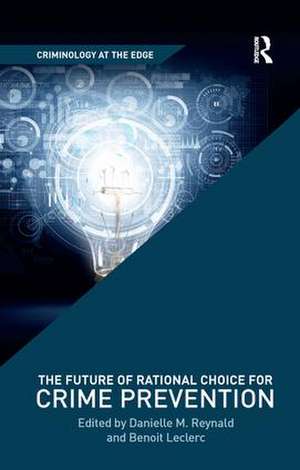The Future of Rational Choice for Crime Prevention: Criminology at the Edge
Editat de Danielle Reynald, Benoit Leclercen Limba Engleză Paperback – 4 feb 2019
This book explores various perspectives, which include the development of frameworks based on the role of situations in crime or forensic sciences for improving crime prevention practices. The need to consider affective states and other offender-related factors to improve our understanding of offender decision-making models is highlighted as a means to better predict which SCP mechanisms may be most useful in discouraging particular types of offenders. Finally, it is also argued that the use of RCP should be more pragmatic and that this perspective should be preserved and adapted based on what we find in our experiments.
Taken together, these theoretically distinctive and challenging contributions ultimately guide how crime prevention practices could be best approached in the future.
| Toate formatele și edițiile | Preț | Express |
|---|---|---|
| Paperback (1) | 407.57 lei 6-8 săpt. | |
| Taylor & Francis – 4 feb 2019 | 407.57 lei 6-8 săpt. | |
| Hardback (1) | 993.97 lei 6-8 săpt. | |
| Taylor & Francis – 21 sep 2017 | 993.97 lei 6-8 săpt. |
Preț: 407.57 lei
Nou
Puncte Express: 611
Preț estimativ în valută:
78.01€ • 81.12$ • 65.27£
78.01€ • 81.12$ • 65.27£
Carte tipărită la comandă
Livrare economică 15-29 martie
Preluare comenzi: 021 569.72.76
Specificații
ISBN-13: 9780367227470
ISBN-10: 0367227479
Pagini: 134
Ilustrații: 4
Dimensiuni: 138 x 216 x 7 mm
Greutate: 0.25 kg
Ediția:1
Editura: Taylor & Francis
Colecția Routledge
Seria Criminology at the Edge
Locul publicării:Oxford, United Kingdom
ISBN-10: 0367227479
Pagini: 134
Ilustrații: 4
Dimensiuni: 138 x 216 x 7 mm
Greutate: 0.25 kg
Ediția:1
Editura: Taylor & Francis
Colecția Routledge
Seria Criminology at the Edge
Locul publicării:Oxford, United Kingdom
Public țintă
Postgraduate and UndergraduateCuprins
1. What could be the future of rational choice for crime prevention? Benoit Leclerc and Danielle M. Reynald, 2. Does situational crime prevention require a rational offender? Richard Wortley and Nick Tilley, 3. Hot criminology or what Homer’s Odyssea can teach criminologists about decision-making, Jean-Louis van Gelder, 4. Theorising forensic science: a model for crime prevention, Paul Knepper, 5. A baseline model of deterrence, Matthew Manning, 6. Another look at person-situation interaction: what offenders are sensitive to what situational crime prevention measures? Henk Elffers and Danielle M. Reynald
Notă biografică
Danielle M. Reynald is a criminologist at the Griffith Criminology Institute and senior lecturer at the School of Criminology and Criminal Justice at Griffith University, Brisbane, Australia.
Benoit Leclerc is a researcher at the Griffith Criminology Institute and associate professor of criminology and criminal justice at Griffith University, Brisbane, Australia.
Benoit Leclerc is a researcher at the Griffith Criminology Institute and associate professor of criminology and criminal justice at Griffith University, Brisbane, Australia.
Recenzii
"Hurray! This is the book my students and I have been awaiting: a systematic rational discussion of the problems, advantages, and future directions of offender choice perspectives. Danielle Reynald and Benoit Leclerc have produced an essential book probing the foundations of scientific and practical crime prevention. Only irrational criminologists will ignore it."
- John E. Eck, Professor of Criminal Justice, University of Cincinnati, USA
"The idea that offending involves rational decision-making has been extremely important in criminology and has had significant practical implications for situational crime prevention. This book presents many insightful findings on these topics, including the influence of emotional factors as well as the subjective costs and benefits of offending, and the importance of interactions between types of people and types of situations. It should be of great interest to all criminologists, especially in advancing the understanding of offender decision-making and its implications for crime prevention."
- David P. Farrington, Emeritus Professor of Psychological Criminology, University of Cambridge, UK
"A closer look at Jeremy Bentham's original work shows that he had a very nuanced and diversified view of what pleasures and punishments people consider when they make decisions. Bentham was not fortunate enough to have the data or the accumulated research now available. In the current volume the contributors apply more modern knowledge to evaluate how offenders make choices, the nuances affecting their choices, and how this extra information helps us design lower crime rates."
- Marcus Felson, Professor in the School of Criminal Justice, Texas State University, USA
- John E. Eck, Professor of Criminal Justice, University of Cincinnati, USA
"The idea that offending involves rational decision-making has been extremely important in criminology and has had significant practical implications for situational crime prevention. This book presents many insightful findings on these topics, including the influence of emotional factors as well as the subjective costs and benefits of offending, and the importance of interactions between types of people and types of situations. It should be of great interest to all criminologists, especially in advancing the understanding of offender decision-making and its implications for crime prevention."
- David P. Farrington, Emeritus Professor of Psychological Criminology, University of Cambridge, UK
"A closer look at Jeremy Bentham's original work shows that he had a very nuanced and diversified view of what pleasures and punishments people consider when they make decisions. Bentham was not fortunate enough to have the data or the accumulated research now available. In the current volume the contributors apply more modern knowledge to evaluate how offenders make choices, the nuances affecting their choices, and how this extra information helps us design lower crime rates."
- Marcus Felson, Professor in the School of Criminal Justice, Texas State University, USA
Descriere
Bringing together leading experts from psychology, criminology, sociology and economics, this book asks whether the rational choice approach exceeded its usefulness in crime prevention and considers alternative possibilities for future research.




